3. Tingling in the arms or other extremities
A tingling sensation in your hands, arms, legs or feet is not only uncomfortable but also a cause for concern. Tingling is easy to ignore, but it is a sign from the body of illness.
Tingling is related to circulation problems and diseases such as anemia, diabetes, multiple sclerosis and Buerger’s disease — a condition of the arteries and veins. Tingling in the feet may also be a sign of kidney issues.
If tingling is your only symptom, you can wait to see your regular doctor to investigate. But a tingling sensation that lasts for more than an hour and is accompanied by other symptoms like dizziness and nausea requires immediate medical help.
4. Dizziness
Dizziness or lightheadedness can be caused by disturbances in the brain, the gastrointestinal system, vision or the inner ear. Dizziness is one of the most common symptoms that cause people to seek medical attention.
If you feel dizzy for more than an hour and develop other symptoms, such as nausea and vomiting, seek medical attention. Dizziness is also related to several other health issues, including high blood pressure, low blood pressure, diabetes, thyroid disease, anemia, dehydration and heart conditions.
5. Sweating
Excessive sweating may be caused by a variety of factors, including hot flashes, exercise, stress, excess weight or even spicy food. Heavy sweating may also be a sign of thyroid problems, diabetes or heart issues.
If you are sweating more than usual, you don’t need to call 911, but you should consult a physician to rule out a serious underlying medical condition.
6. Numbness
Numbness in the face, arms or legs can be a very serious signal, especially if the feeling is on one side of the body, as this could indicate a stroke. This symptom may be accompanied by sudden confusion, difficulty speaking or understanding, as well as blurred vision.
Numbness is also associated with several other illnesses, including Lyme disease, Guillain-Barre syndrome and diabetes, and a herniated disk. No matter what the cause, numbness should always be investigated, and if it is accompanied by other symptoms of a stroke, call an ambulance immediately.
7. Swelling
Swelling is usually due to inflammation or a buildup of fluid and may result from a range of conditions. The most common reason for swollen feet or ankles is poor circulation. In older people, it could mean their blood vessels are weakening. It could also be an indication of a blood clot blocking the veins.
One of the more serious conditions associated with swelling is edema, which happens when an abnormal amount of fluid builds up in the body. Edema can damage the heart, make you feel weak when walking and cause swollen ankles.
Always investigate the cause of any type of swelling. And if you experience swollen ankles, make an appointment with your doctor right away.
Immediate Medical Care
When serious health symptoms occur, an ambulance is the quickest way to receive immediate attention. Emergency medical technicians can provide immediate care at the scene and in the ambulance. If you drive yourself or someone else to the hospital, there will be an emergency room wait and precious time may be lost.




